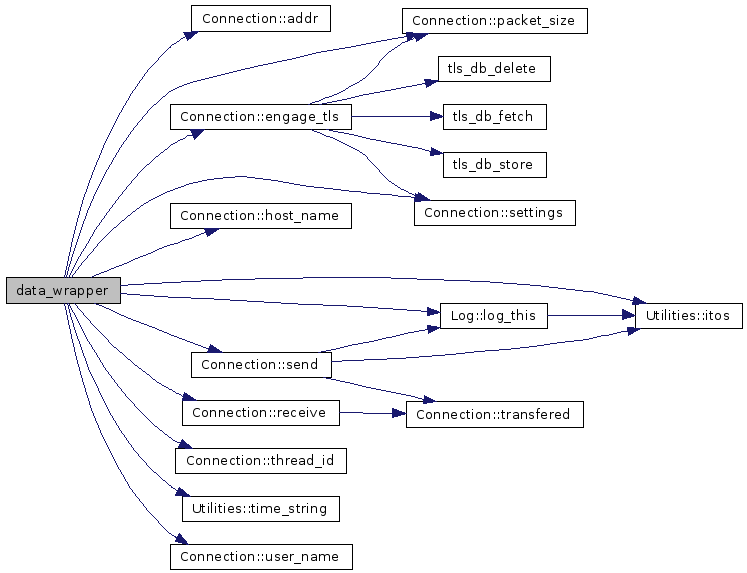DocumentationGenerated on Thu Aug 31 00:02:31 2006 |
|||||||||||||||||||||||||||||||||||||||||||||||||||
Commands.cpp File Reference#include "Commands.h"Include dependency graph for Commands.cpp:  Go to the source code of this file.
Define Documentation
Definition at line 12 of file Commands.cpp.
Definition at line 10 of file Commands.cpp.
Definition at line 11 of file Commands.cpp.
Function Documentation
Definition at line 17 of file Commands.cpp. References Connection::addr(), ANONYMOUS, BINARY, config, Connection::engage_tls(), Connection::host_name(), Utilities::itos(), Log::log_this(), Configuration::logger, logging, my_data, Connection::packet_size(), PWBUF_SIZE, Connection::receive(), RETR_TRANS, Connection::send(), Connection::settings(), Connection::thread_id(), Utilities::time_string(), TLS_PROT_D, TYPE_DEBUG, TYPE_XFER, Data::user, Connection::user_name(), util, and log_stru::xferlog. Referenced by Commands::retr(), and Commands::stor(). 00018 { 00019 class Data *data = static_cast<class Data*>(void_data); 00020 string message; 00021 time_t start_time = time(NULL); 00022 size_t trans_size = 0; // will hold the total number of sent bytes 00023 00024 data->thread_id(pthread_self()); 00025 00026 pthread_setspecific(my_data, void_data); 00027 pthread_setcanceltype(PTHREAD_CANCEL_ASYNCHRONOUS, NULL); 00028 00029 data->host_name(inet_ntoa(data->addr().sin_addr)); 00030 00031 // I don't like it, but we need to drop permissions again... 00032 // not true for new threads, need to look deeper into this. 00033 struct passwd pwd, *pwd_ptr; 00034 char pwdata[PWBUF_SIZE]; 00035 getpwnam_r(data->user->user_name().c_str(), &pwd, pwdata, sizeof(pwdata), 00036 &pwd_ptr); 00037 uid_t uid = pwd.pw_uid; 00038 gid_t gid = pwd.pw_gid; 00039 setuid(uid); 00040 setgid(gid); 00041 00042 #ifdef USE_TLS // handshakes etc 00043 if(data->settings(TLS_PROT_D)) 00044 if(!data->engage_tls()) // failed handshake 00045 message = 00046 "451 Failed to negotiate TLS as was asked. Closing data connection."; 00047 #endif // USE_TLS 00048 while(message.empty()) 00049 { 00050 char *read_buf = new char[data->packet_size()]; 00051 size_t size = 0, size2 = 0; 00052 if(data->settings(RETR_TRANS)) 00053 { 00054 size2 = read(data->file_id(), read_buf, data->packet_size()); 00055 if(size2 > 0) 00056 size = data->send(read_buf, size2); 00057 } 00058 else // STOR_STRANS 00059 size = data->receive(read_buf, data->packet_size() - 1); 00060 00061 trans_size += size; 00062 if(!data->settings(RETR_TRANS)) 00063 { 00064 if(size != 0 && (write(data->file_id(), read_buf, size) == -1)) 00065 { 00066 logging->log_this(3, TYPE_DEBUG, "Write failed to file: " + 00067 data->file_name() + " from host: " + data->host_name() + 00068 " with error %m"); 00069 message = "451 File transfer failed."; 00070 } 00071 else if(size == 0) 00072 { 00073 if(close(data->file_id()) != 0) 00074 message = "550 Failed saving file."; 00075 else 00076 message = "226 Transfer complete."; 00077 } 00078 } 00079 else // RETR_TRANS 00080 { 00081 if(size != size2) 00082 message = "550 Transfer failed."; 00083 else if(size2 != data->packet_size()) 00084 message = "226 Transfer complete."; 00085 } 00086 delete[] read_buf; 00087 } 00088 00089 *data->user << message << "\r\n"; 00090 if(config->logger.xferlog) 00091 { 00092 string time_string; 00093 util.time_string(time_string, "%a %b %d %H:%M:%S %Y "); 00094 00095 // as ' ' separates fields in the xferlog we convert them to '_' here 00096 string temp_name = data->file_name(); 00097 for(string::iterator name_it = temp_name.begin(); 00098 name_it != temp_name.end(); name_it++) 00099 if(isspace(*name_it)) 00100 *name_it = '_'; 00101 00102 // let us build a string! 00103 string xferlog = time_string; 00104 xferlog += util.itos(time(NULL) - start_time); 00105 xferlog += " " + data->host_name(); 00106 xferlog += " " + util.itos(trans_size); 00107 xferlog += " " + temp_name + " "; 00108 xferlog += (data->settings(BINARY)?"b":"a"); 00109 xferlog += " _ "; // we don't support any special-action to flag here. 00110 xferlog += (data->settings(RETR_TRANS)?"o":"i"); 00111 xferlog += (data->user->settings(ANONYMOUS)? // a for anonymous, r for real 00112 " a " + data->user->anonymous_id(): // if the user is anonymous we log 00113 " r " + data->user->user_name()); // the id string, else the user name. 00114 xferlog += " FTP"; // maybe ftps for encrypted? no. IANA. 00115 xferlog += " 0"; // there should be more auth methods available here? 00116 xferlog += " *"; // or should this be uid? 00117 00118 logging->log_this(1, TYPE_XFER, xferlog); 00119 } 00120 00121 pthread_exit(NULL); 00122 }
Here is the call graph for this function: 
Definition at line 171 of file Commands.cpp. References pam_data::password, and pam_data::user_name. Referenced by Commands::pass(). 00173 { 00174 struct pam_response *reply = NULL; 00175 int count = 0; 00176 struct pam_data *auth_data = (static_cast<struct pam_data*>(appdata_ptr)); 00177 00178 for(int i = 0; i < num_msg; i++) 00179 { 00180 struct pam_response *reply_tmp; 00181 switch(msg[i]->msg_style) 00182 { 00183 case PAM_PROMPT_ECHO_ON: 00184 case PAM_PROMPT_ECHO_OFF: 00185 reply_tmp = (static_cast<struct pam_response*> 00186 (malloc(sizeof(struct pam_response) * (count + 1)))); 00187 memcpy(reply_tmp, reply, count); 00188 if(reply) 00189 free(reply); 00190 reply = reply_tmp; 00191 00192 // is this really how it should be done? 00193 if(msg[i]->msg_style == PAM_PROMPT_ECHO_ON) 00194 reply[i].resp = strndup(auth_data->user_name.c_str(), 00195 auth_data->user_name.size()); 00196 else 00197 reply[i].resp = strndup(auth_data->password.c_str(), 00198 auth_data->password.size()); 00199 00200 reply[count++].resp_retcode = PAM_SUCCESS; 00201 break; 00202 00203 case PAM_TEXT_INFO: 00204 break; 00205 00206 case PAM_ERROR_MSG: 00207 default: 00208 if(reply) 00209 free(reply); 00210 return PAM_CONV_ERR; 00211 } 00212 } 00213 *resp = reply; 00214 return PAM_SUCCESS; 00215 }
Variable Documentation
Definition at line 15 of file Commands.cpp. Referenced by exit_baby(), Handler::interpreter(), main(), Commands::pass(), and User::~User().
|
|||||||||||||||||||||||||||||||||||||||||||||||||||
- Copyright © 2005, BabyFTPd
- Powered by:


